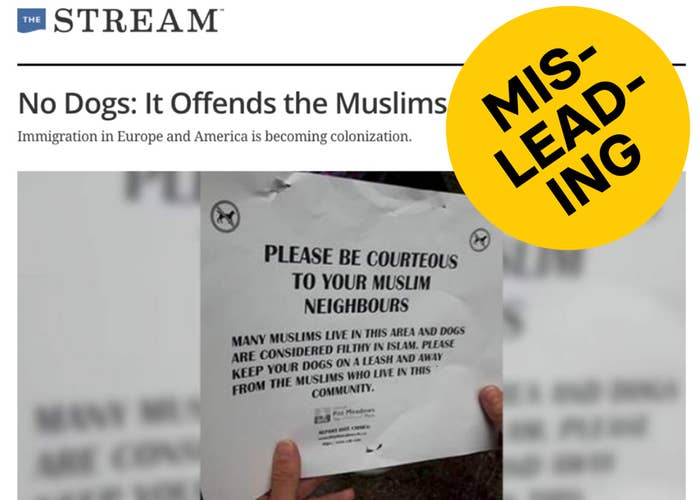
In the summer of 2017, signs that seemed engineered to stoke anti-Muslim sentiment first appeared in a city park in Pitt Meadows, British Columbia.
“Many Muslims live in this area and dogs are considered filthy in Islam,” said the signs, which included the city’s logo. “Please keep your dogs on a leash and away from the Muslims who live in this community.”
After a spate of media coverage questioning their authenticity — and a statement from John Becker, then the mayor of Pitt Meadows, that the city didn’t make them — the signs were discredited and largely forgotten.
But almost two years later, a mix of right-wing American websites, Russian state media, and Canadian Facebook groups have made them go viral again, unleashing hateful comments and claims that Muslims are trying to “colonize” Western society.
The revival of this story shows how false, even discredited claims about Muslims in Canada find an eager audience in Facebook groups and on websites originating on both sides of the border, and how easily they can be recirculated as the federal election approaches.
“Many people who harbor (or have been encouraged to hold) anti-Muslim feelings are looking for information to confirm their view that these people aren't like them. This story plays into this,” Danah Boyd, a principal researcher at Microsoft and the founder of Data & Society, a nonprofit research institute that studies disinformation and media manipulation, wrote in an email.
Boyd said a dubious story like this keeps recirculating “because the underlying fear and hate-oriented sentiment hasn't faded.”
Daniel Funke, a reporter covering misinformation for the International Fact-Checking Network, said old stories with anti-Muslim aspects also recirculated after the recent fire at the Notre Dame cathedral in Paris.
“Social media users took real newspaper articles out of their original context, often years after they were first published, to falsely claim that the culprits behind the fire were Muslims,” he said. “The same thing has happened with health misinformation, when real news stories about product recalls or disease outbreaks go viral years after they were originally published.”
The signs about dogs first appeared in Hoffman Park in September 2017, and were designed to look official. They carried the logo of the city of Pitt Meadows and that of the Council on American–Islamic Relations, a US Muslim advocacy organization.
Media outlets reported on them after an image of one sign was shared online. Many noted that the city logo was falsely used and that there was no evidence actual Muslims were behind the messages.
A representative for CAIR told CBC News in 2017 that his organization had no involvement in the BC signs, but he did have an idea about why they were created.
“We see this on occasion where people try to be kind of an agent provocateur and use these kinds of messages to promote hostility towards Muslims and Islam,” Ibrahim Hooper said in an interview with CBC. “Sometimes people use the direct bigoted approach — we see that all too often in America and Canada, unfortunately — but other times they try and be a little more sophisticated or subtle.”
The "Muslims of Vancouver" Facebook page had a similar view, labeling it a case of “Bigots attempting to incite resentment and hatred towards Muslims.”

After the initial frenzy of articles about the signs, the story died down — until last week, when an American conservative website called the Stream published a story. It cited a 2017 report from CTV Vancouver, without noting that the incident was almost two years old.
“No Dogs: It Offends the Muslims,” read the headline on a story that cited the signs as an example of Muslims not integrating into Western society.
“That sign in the Canadian dog park tells us much that we’d rather not think about. That kind of sign notifies you when your country has been colonized,” John Zmirak wrote.
Zmirak’s post was soon summarized by state-funded Russian website Sputnik and picked up by American conservative site RedState. Writing in RedState, Elizabeth Vaughn said “Muslims cannot expect Americans or Brits or anybody else to change their ways of life to accommodate them.” Conservative commentator Ann Coulter tweeted the RedState link to her 2.14 million followers, and the story was also cited by the right-wing website WorldNetDaily.
The Stream and RedState did not respond to emailed requests for comment. A spokesperson for Sputnik said its story made it clear to readers that the original incident happened in 2017: “I would like to stress that Sputnik has never mentioned that the flyers in question were created by Muslims, Sputnik just reported facts and indicated the sources,” Dmitry Borschevsky wrote in an email.
Nonetheless, the three stories generated more than 60,000 shares, reactions, and comments on Facebook in less than a week. Some of that engagement also came thanks to right-wing Canadian Facebook groups and pages, bringing the dubious tale back to its original Canadian audience.
“Dogs can pick out evil! That’s why Death Cult adherents despise these lil canine truth detectors!” wrote one person in the “Canadians 1st Movement” Facebook group after seeing the RedState link.
“How about no muslims!” wrote one person after the Sputnik story was shared in the "Canadian Combat Coalition National" Facebook group. Another commenter in the group said he’d prefer to see Muslims “put down” instead of dogs.
On the page of anti-Muslim organization Pegida Canada, one commenter wrote, “I will take any dog over these animals.”
Those reactions were likely intended by whoever created the signs, according to Boyd, and it wasn’t the first incident of this type. In July 2016, flyers appeared in Manchester, England, that asked residents to “limit the presence of dogs in the public sphere” out of sensitivity to the area’s “large Muslim community.”
The origin of the flyers was equally dubious, with evidence suggesting the idea may have been part of a campaign hatched on the anonymous message board 4chan. That’s where internet trolls often plan online harassment and disinformation campaigns aimed at generating outrage and media coverage.
“At this point, actors in 4chan have a lot of different motives, but there is no doubt that there are some who hold white nationalist attitudes and espouse racist anti-Muslim views,” Boyd said.
“There are also trolls who relish playing on political antagonisms to increase hostility and polarization. At the end of the day, the motivation doesn't matter as much as the impact. And the impact is clear: These posters — and the conspiracists who amplify them — help intensify anti-Muslim sentiment in a way that is destructive to democracy.”
BuzzFeed News and the Toronto Star are investigating the ways in which political parties, third-party pressure groups, foreign powers, and individuals are influencing Canada’s political debate in the run-up to this fall’s federal election. This report was published as part of that collaboration.


